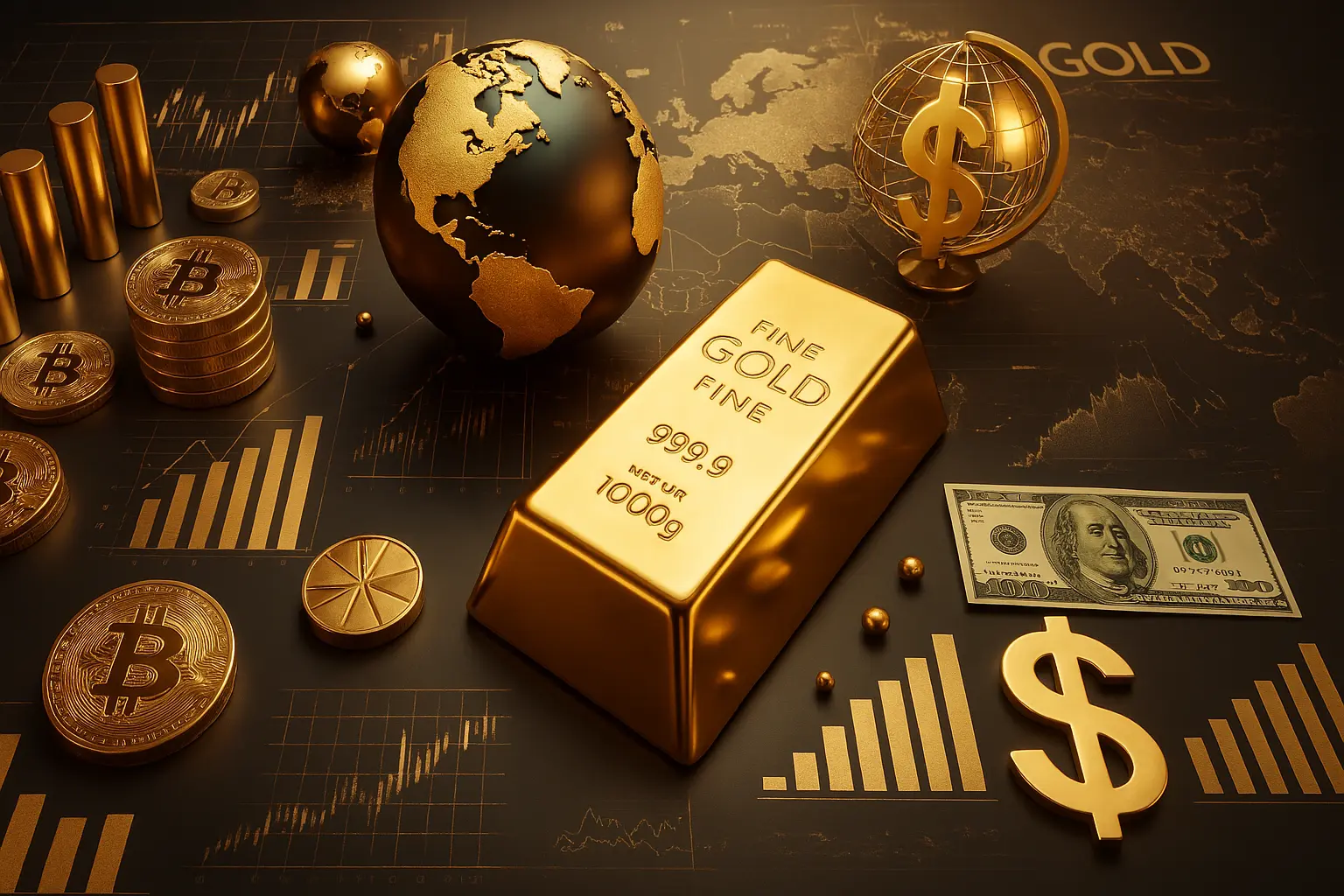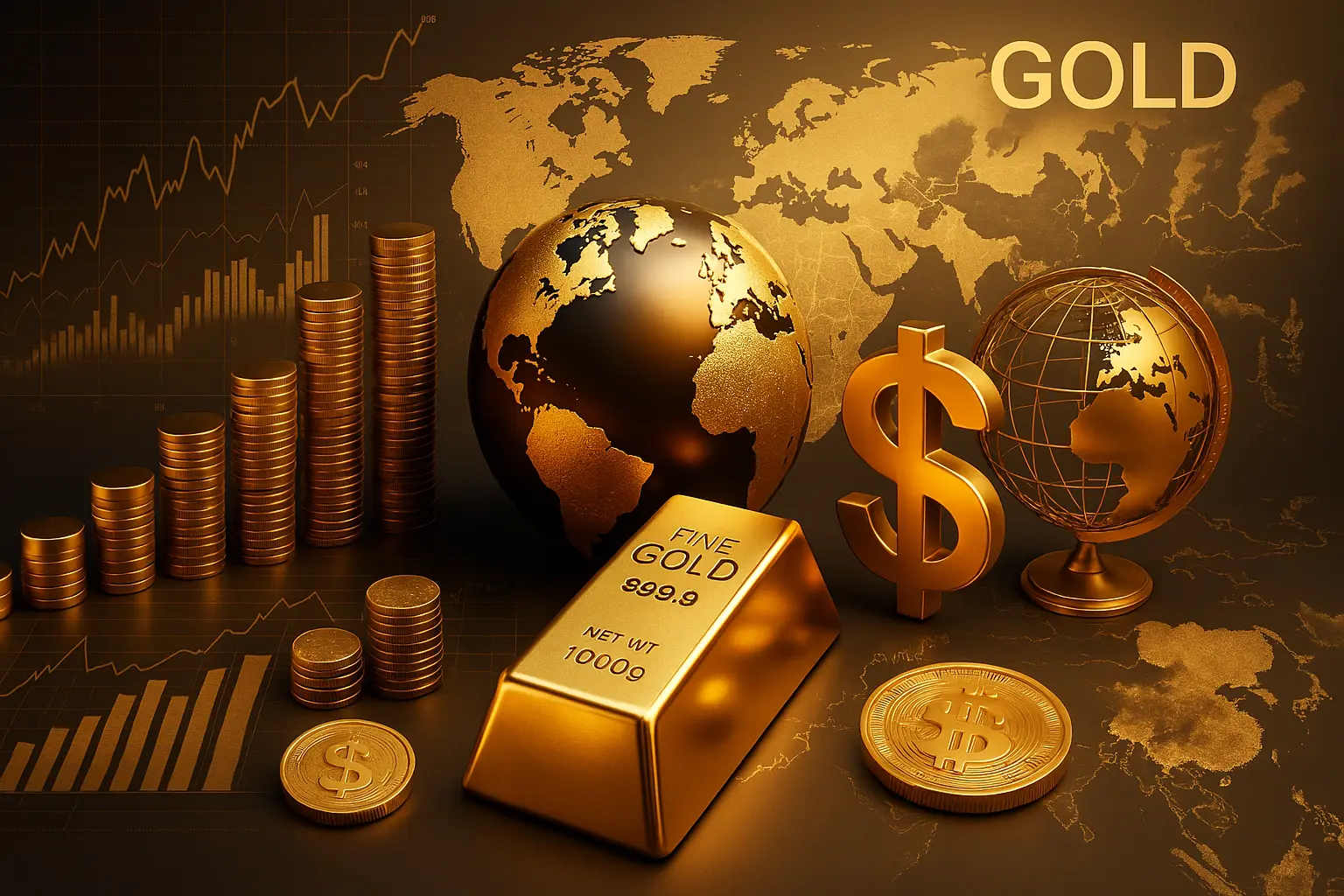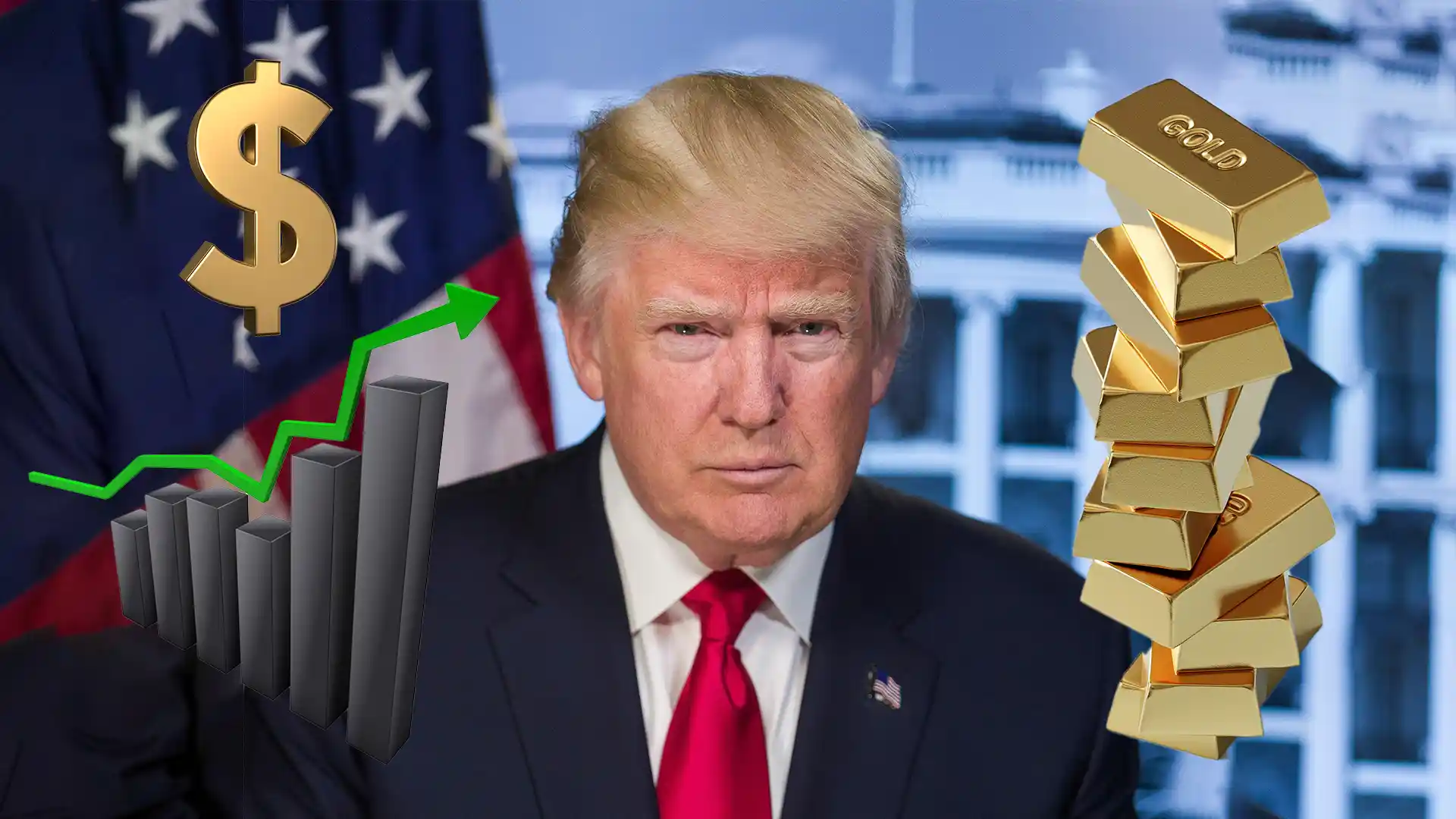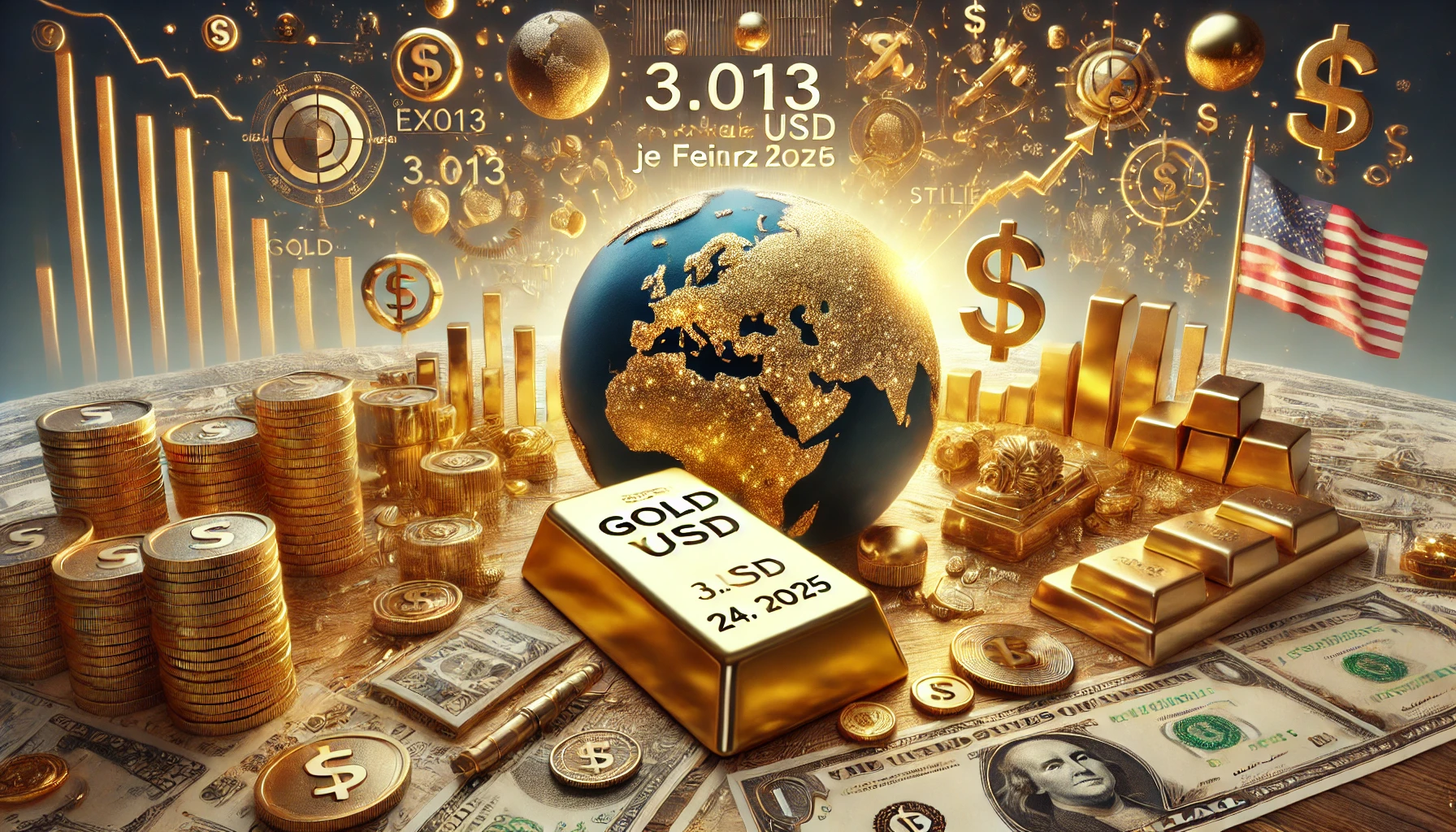Table of contents
Economy & Markets
Gold as a power factor: Traffic Light Coalition break-up and Trump's comeback in the geopolitical game
Dr. Mathias Kunze
Senior Consultant in Commercial and Tax Law
8 min.
Published on: 12.11.2024 | 09:42 UTC
Updated on:
14.11.2024 | 10:30 UTC

New geopolitical landscape: The end of the Traffic Light Coalition and Trump's return to the White House
Source: ChatGPT (OpenAI)
While the Traffic Light Coalition in Germany is only running on a low flame and has mutated into a “pedestrian traffic light”, Trump's comeback promises new dynamics in global politics. Precious metals could become a political instrument to strengthen national interests and reduce dependencies. While Germany must first reorient itself, Trump is already relying on other proven means to strengthen US sovereignty.
Gold at the center of global power games
Gold, the eternal symbol of wealth and security, occupies a central position in the current geopolitical landscape. With the recent political developments in the United States and Germany, the global gold markets are facing potentially disruptive changes. The impending political comeback of Donald Trump in the US and the end of the Traffic Light Coalition in Germany are more than just headlines: they are turning points that could redefine the strategic use of gold as a geopolitical tool.
Donald Trump's return to power could bring with it a renewed emphasis on the importance of gold as a tool to promote national strength and economic independence. His policies in the past have already shown that he sees gold as an integral part of American economic security. At the same time, the possible failure of the Traffic Light Coalition in Germany could lead to a political reorientation, which would also have a profound impact on the country's gold reserve policy.
These political developments should not be viewed in isolation, but as part of a larger picture of global power relations and economic strategies that shape the behavior of states on international markets and in diplomacy. Gold remains a critical factor that underpins the economic stability and political sovereignty of nations, while also serving as a safety net in uncertain times.
Gold as a geopolitical actor
Gold has a fundamental importance in economic policy as a strategic reserve and serves as a stabilizing factor that central banks and states around the world use to strengthen their economic independence and sovereignty. Unlike currencies or other forms of investment, gold is independent of the economic performance of individual countries; its value is not influenced by governments. These characteristics make gold a robust asset that maintains a stable value even in times of crisis and geopolitical tensions. Central banks hold gold reserves to ensure their ability to meet financial obligations, to strengthen confidence in their currency and to hedge against potential risks. Gold acts as a hedge against inflation risks and currency devaluations while providing high liquidity, allowing central banks to access capital quickly when needed.
Due to its universal acceptance, gold serves as an international anchor that not only secures a country's prosperity, but also supports credibility and confidence in its economic stability. For many countries, gold represents a hedge against external economic shocks and strengthens their position on the international financial market, which is particularly evident in times of geopolitical uncertainty and tension. For this reason, some countries have systematically increased their gold reserves in recent decades.
Russia is an outstanding example of the strategic use of gold to promote economic independence. In 2023, Russia's gold reserves amounted to around 2,300 tons, which corresponds to 32.9% of the country's total assets - a considerable proportion that underlines the growing importance of the precious metal in Russian financial policy. With the expansion of these gold reserves, Russia is pursuing the goal of minimizing its dependence on the US dollar and becoming more economically independent, particularly in response to Western sanctions and possible further restrictions on global trade. These reserves serve to protect the Russian rouble, support the domestic currency and strengthen the country's negotiating position in international markets.
China has also pursued a targeted gold policy in recent years and has continuously increased its gold reserves in order to strengthen its economic sovereignty. The Chinese central bank has established gold as a key component of its strategy in order to diversify its currency reserves and reduce its dependence on US dollar assets. China's gold reserves have now grown to over 2,000 tons. China uses these reserves not only to hedge its own economy, but also to support the renminbi in order to position it as a stable alternative to the dollar on international markets. This strategy is seen as a necessary step to consolidate China's global influence and ensure its long-term economic stability.
Another example of the strategic use of gold can be found in India. As one of the world's largest markets for physical gold, India has a historical and cultural affinity with this precious metal, which is also anchored in its national financial policy. The Reserve Bank of India holds considerable amounts of gold, which serves as a buffer against external economic fluctuations and currency risks. India's gold reserves have been used as a means of strengthening the rupee, particularly over the last two decades, to promote confidence in its economy and to safeguard the stability of the national currency. Given the volatility in the global financial markets, gold remains an essential asset for India to hedge against inflation risks and currency fluctuations and to strengthen the country's position in the international economic structure.
These examples alone illustrate how various countries use gold specifically to secure their economic and political stability. Gold is more than just an asset - it is a geopolitical instrument that consolidates the economic resilience and independence of nations and at the same time strengthens their position of power on international markets.
Trump's return and the US gold strategy
While countries such as Russia, China and India are using the precious metal strategically to strengthen their economic and political independence, the question arises as to how the United States is reacting to these developments. With Donald Trump's return to power, a fundamental realignment of the US gold strategy could emerge, which could have far-reaching consequences for national and global economic policy.
During his first term in office, Trump showed a clear preference for economic strategies aimed at strengthening national sovereignty and reducing dependence on foreign markets. A key component of this policy has been an increased focus on domestic resources and reserves, potentially including gold. In the past, Trump supported a policy that emphasized gold as a stable store of value in the national reserves. His aim was to achieve greater independence from global currency fluctuations and geopolitical influences.
With his return to power, Trump could intensify this strategy and increase the proportion of gold in the US reserves in order to decouple the US from the dominance of the US dollar as the sole reserve currency. This approach would be a hedge against potential currency devaluations and could consolidate the US's position on the global financial market, even if the US dollar were to weaken. Trump could also create incentives for private and institutional gold investments in order to increase the flow of gold within the US and boost domestic gold production. In this context, the expansion of gold reserves would not only be an economic but also a geopolitical signal to other major powers that the US is further expanding its financial independence.
Furthermore, an intensified US gold policy under Trump could have international repercussions. An aggressive purchase of gold by the US Federal Reserve would tighten the global gold market and drive up the price of the precious metal. These purchases would possibly also prompt other countries to increase their own gold holdings in order to remain competitive. The growing demand would strengthen the value of gold worldwide and establish the precious metal even more strongly as a strategic store of value. These measures would not only protect the US from economic turmoil, but also reinforce its position as an economic power.
Germany's political situation and the consequences for gold
The end of the Traffic Light Coalition in Germany marks a turning point that could have far-reaching consequences for German economic policy and the management of gold reserves. In a phase of political reorientation, the new government could be forced to adapt economic and monetary policy strategies in order to strengthen public and international market confidence. In this context, the question arises as to how Germany will integrate its gold reserves into its future financial strategy.
One possible consequence of the change of government could be an increased focus on securing and potentially expanding gold reserves in order to support national economic sovereignty and protect the country against external economic risks. In recent decades, Germany has stored a large proportion of its gold reserves abroad, particularly in the US and the UK, in order to ensure broad geographical diversification. However, the change of course that is now necessary could call this policy into question, as securing and repatriating part of the gold reserves to one's own country could be seen as a symbol of economic independence and stability. A repatriation of gold could also be perceived as a measure to strengthen the domestic financial markets and signal that Germany is adapting its gold policy to the current geopolitical situation.
Given the experience of other countries such as Russia, which has systematically increased its gold reserves, Germany could also pursue a proactive gold strategy in an increasingly uncertain global environment. This could involve not only storage, but also a possible expansion of gold holdings. Such a reorientation of German gold policy would anchor the precious metal more firmly as a strategic instrument and send a clear message to the international markets: Germany is keen to maintain its economic stability and independence. Overall, a changed gold strategy would therefore enable Germany to consolidate its position in Europe and on the global financial markets.
Global impact on the gold markets
The latest political developments in the US and Germany are generating a dynamic on the global gold markets that extends far beyond national borders. The political uncertainty in these key countries has the potential to increase demand for gold worldwide, as governments and investors rely on the stability of the precious metal. The return of Donald Trump as president in the US and the intended realignment of the German government signal potential political and economic change, which will unsettle the global financial markets and increase the appeal of gold as a crisis-proof investment. This could lead to a considerable increase in demand and thus to a further price increase on the international gold market.
As two of the world's most important economies, the US and Germany influence not only their own markets with their gold policy, but also the strategies of other countries. If the US were to buy gold aggressively under Trump and Germany were to consider reducing and expanding its gold reserves, other countries could also rethink their own gold strategies in order to avoid falling behind economically. These imitation effects could occur particularly in emerging countries, which have increasingly begun to invest gold reserves as a hedge against economic instability in recent years. Established economies such as Japan or Canada could also react to the increased gold policy of the US and Germany in order to hedge against potential currency risks and geopolitical tensions.
For countries with weaker currencies in particular, gold offers an opportunity to shield themselves from the risks of the international financial markets and preserve economic sovereignty. These countries could find themselves increasingly forced to reduce their dependence on traditional currency reserves and rely more on gold as a stable asset. This trend would drive demand for gold even further and consolidate the precious metal's role as a central component of global financial security.
If this development continues, a new trend towards “gold standardization” could emerge, in which countries increasingly rely on gold as a backing for their currency reserves in order to become less dependent on the fluctuations of the global financial markets.
Last but not least: gold as a strategic power factor in a new world order
The comeback of Donald Trump in the US and the end of the Traffic Light Coalition in Germany not only mark political turning points, but also reflect a new phase in the geopolitical significance of gold. The changes in the US and Germany may mean that gold is increasingly seen as an indispensable tool for strengthening national power and economic stability in these two countries. Under Trump's renewed leadership, the United States may increasingly rely on gold to promote strategic independence from the dollar and underpin its position as a global economic power. Germany, on the other hand, is faced with the task of manifesting its political reorientation on the precious metals markets while at the same time ensuring strong European stability.
These developments make it clear that gold is gaining in importance as a power factor in the changing geopolitical landscape. The purchases and reserve shifts of the two leading economies are not only influencing the dynamics on the gold markets, but are also encouraging other countries to rethink their own strategies and, if necessary, align themselves with these changing power relations. Gold is and remains the central element that not only provides economic security, but also serves as a signal of sovereignty and geopolitical strength.
With the US and Trump and the German government focusing on gold as a strategic tool, the precious metal is becoming a symbol of economic self-determination and international influence. Gold will therefore continue to establish itself as a key resource in the geopolitical game and will presumably retain this function in future crises and power shifts.
Dr. Mathias Kunze
Senior Consultant in Commercial and Tax Law
Blog

All-time high: Gold price breaks through USD 3,000 for the first time

Gold in industry: A detailed analysis of its interactions with halogens and in cyanide solutions







